This article needs additional citations for verification .(October 2018) |
Mecate are a rap music group from El Salvador. [1]
This article needs additional citations for verification .(October 2018) |
Mecate are a rap music group from El Salvador. [1]
The band was born at some stage during 1998 in Jorge Manuel's (a.k.a. "Piocha") house. Piocha was a talented guitarist with some exposure to the Salvadoran rock scene who often experiment musically with Ernesto Asecas ("Neto") and Enrique Salopino ("Pino") who both lacked musical background and had only recently been exposed to hip-hop music.
With time the experiment took a more defined shape and added new recruits, including drummer Carlos Alfredo (alias "Kalimba"), Rafa, and chorus girl and dancing king Jose Manuel ("Lady"). The sessions culminated in an ill-fated performance during a school event in the Salvadoran British School (ABC), where the band performed their original track "Armando Pleito." Audience members were reported to have been "thoroughly disgusted" by the lack of skill, talent, and "any sort of entertainment value whatsoever"; backstage the band was escorted by the event organizer and invited to retire from the music scene indefinitely.
But their ingenuity kept them going, and with the aid of Fruity Loops software, Neto, Lady, and Kique began to prepare some home-brewed tracks. Only after several attempts did the band manage to get some of their tracks on the air.
With the single "El Directo", Mecate tapped a vein in the country's conscience, by playing in the mainstream's ears the story of a heavily controversial underaged gang-member accused of at least 18 killings. [2] [3] The title created serious debate in the local media, including a ruling by the Interior Minister to ban it from the airwaves. [2] [4] [5]
The band disbanded in order to pursue academic studies. However, thanks to the Internet they kept making sporadic attempts to reenter the Salvadoran airwaves with a few tracks such as "Poder Latino" and "Prototipo" and eventually contributions with Pescozada for "Movimiento" and Ayutush for "Paranoia". At some stage the talented Demetrio Soto Martinez ("Demi") joined the group and laid down what are arguably some of the best verses to date in Latin hip-hop, with a unique rhyme style.
Latin hip-hop is hip-hop music that is recorded by artists in the United States of Hispanic and Latino descent along with Spanish-speaking countries in the Caribbean, North America, Central America, South America, and Spain.

The music of El Salvador refers to Music of the Republic of El Salvador and is encompassed in the wider Latin American musical traditions.

Club Deportivo Atlético Marte, also known as Atlético Marte, is a Salvadorian association football club based in San Salvador.
Pescozada is a hip-hop group formed in Chalatenango, El Salvador. Their name means "slap" or "punch" in modern Spanish. They are also well known throughout El Salvador for addressing political situation, its problems, and its civil war.
Salvadoran rap or Guanaco hip hop is a type of rap music that comes from El Salvador. It is a style of music that emerged from groups such as Pescozada and Mecate in the late 1990s. Salvadoran hip hop arose about 30 years ago following a large migration of Salvadorans to LA. Their arrival occurred during a surge in popularity of hip hop in the United States, which allowed them to participate. Salvadoran hip hop is still a smaller kind of music but it is an important part to communities and the lives of many Salvadorans.

Omnionn is a music producer of Salvadoran music. He is particularly active in the Salvadoran hip hop scene, where he is the official producer of Pescozada. He is also widely known as an artist of Electronic music. Ominonn resided in San Francisco, California for most of his life, but has dedicated himself to help establish an urban music scene in El Salvador, and in 2006 moved back to his home country.
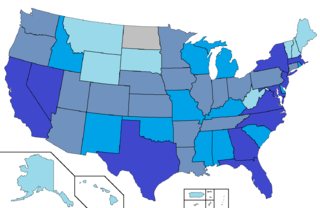
Salvadoran Americans are Americans of full or partial Salvadoran descent. As of 2010, there are 2,195,477 Salvadoran Americans in the United States, the fourth-largest Latino community by nation of ancestry. According to the Census Bureau, in 2016 Salvadorans made up 3.8% of the total Latino population in the US.

Lesbian, gay, bisexual, transgender, and other non-cisgender or non-heterosexual (LGBT) persons in El Salvador face legal and social challenges not experienced by non-LGBT residents. Same-sex sexual activity of all genders are legal in El Salvador, but same-sex couples and households headed by same-sex couples are not eligible for the same legal protections available to opposite-sex married couples.
Club Deportivo Topiltzín are a Salvadoran professional football club based at Jiquilisco, Usulután in El Salvador.
Edwin Ernesto Portillo is a former Salvadoran professional footballer and current manager.
Club Deportivo Aspirante is a Salvadoran professional football club based in Jucuapa, Usulután, El Salvador.
El Salvador recognizes neither same-sex marriage, civil unions or any other legally recognized union for same-sex couples. A proposal to constitutionally ban same-sex marriage and adoption by same-sex couples was rejected twice in 2006, and once again in April 2009 after the Farabundo Martí National Liberation Front (FMLN) refused to grant the measure the four votes it needed to be ratified.
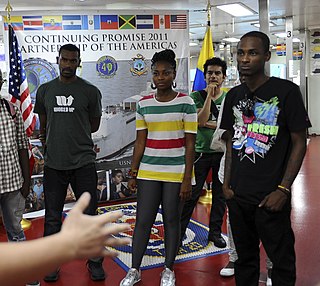
ChocQuibTown is a Colombian hip-hop group that fuses various musical genres. Although the band formed in Cali, the members are originally from the Colombian department of Chocó. The group consists of Carlos "Tostao" Valencia (rapping), Gloria "Goyo" Martínez, and Miguel "Slow" Martínez. The band's music draws influence from a wide variety of modern genres including hip-hop and more recently electronica, combined with traditional Colombian genres including salsa, Latin jazz, and Afro-Latin rhythms.
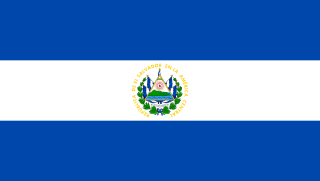
The Salvadoran military dictatorship, officially known as the Republic of El Salvador, and simply known as El Salvador, was the period of time in Salvadoran history where the Salvadoran Armed Forces governed the country for almost 48 years from 2 December 1931 until 15 October 1979. The authoritarian military dictatorship limited political rights throughout the country and maintained its governance through rigged and fixed elections.

Club Deportivo Futbolistas Asociados Santanecos, commonly known as FAS, is a professional Salvadoran football club based in Santa Ana.
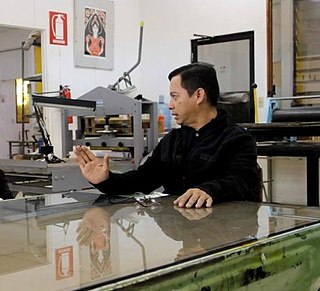
Giovanni Gil, also known as Hector Giovanni Gil Portillo is a plastic artist and one of the greatest exhibitors of Engraving in El Salvador. He is the founder and director of the projects Soñar al Revés [Dreaming Backwards] and Bajo Presión [Under Pressure] and is the winner of the Silver Medal at the Salon of Contemporary Art El Salvador-

Hugo Roger Martínez Bonilla is a Salvadoran industrial engineer, politician, diplomat and writer. He is a member of the Farabundo Martí National Liberation Front (FMLN), one of the two major political parties in El Salvador. Martínez served as Foreign Minister of El Salvador from 2009 until 2013 under former President Mauricio Funes and again from 2014 to 2018 within the government of President Salvador Sánchez Cerén. In 2019, being the ruling party presidential candidate, he came 3rd with 14%.

The Civic Directory was a military junta which governed El Salvador from 2 to 4 December 1931. The junta was composed of twelve members of the Armed Forces of El Salvador from the army, air force, and National Guard. The directory marked the beginning of the era of military dictatorships in El Salvador which lasted until October 1979 with the 1979 Salvadoran coup d'état and the establishment of the Revolutionary Government Junta, a joint civilian-military government which ruled until 1982.
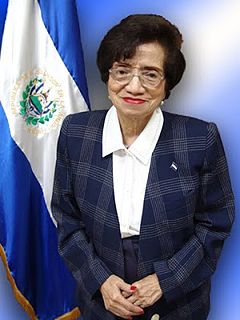
María Isabel Rodríguez is a Salvadoran physician, academic, and government official. In 1956 she became one of the first group of four women to enter the Legislative Assembly. From 1999 to 2007, she was the rector of the University of El Salvador. She was appointed El Salvador's Minister of Health in 2009, a position she held until 2014. She is currently the Presidential Advisor on Health and Education.
Anarchism in El Salvador reached its peak during the labour movement of the 1920s, in which anarcho-syndicalists played a leading role. The movement was subsequently suppressed by the military dictatorship before experiencing a resurgence in the 21st century.